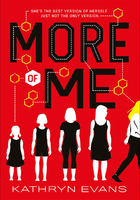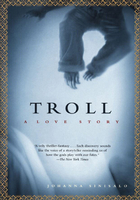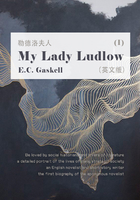WE ARRIVED HOME TO FIND OUR FRONT DOOR TARRED BLACK, TOP TO BOTTOM. It was late, a cloudy night, and none of us saw anything amiss at first—for my part, I was too preoccupied with the task of breathing. All the long drive I'd felt the air changing, turning warmer, thicker, filling with invisible mites that colluded against my lungs. By the time we got home it was all I could do to totter up the steps with the two newswrapped geese in a sack. Dad was right behind me, his arms full of unconscious Swede—who, by the way, was whistling through her nose in an unflattering fashion, proof that this was no faked snooze. Then Davy, who had the house key, said, "What's this junk all over the door?"
What it was was most of the contents of a one-gallon can of Gamble's roofing tar, spread thick over our sturdy portal by means of a putty knife. Next morning we were to find both can and knife tossed among the junipers flanking the house; for the present, Davy simply turned silent and Dad businesslike. He carried Swede across the violated threshold and put her, still dressed, into bed; then, noticing my shallow gasps, ordered me to sit in his own stuffed chair and not move until he could attend to me.
A word here about this business of taking a breath. If you're someone who's never had to think about it, never had to exert muscular effort to do it—never lain awake through endless dark hours knowing you'd stop doing it forever if you happened to fall asleep—then indulge me. Think of a bellows, such as you use to rouse a fire. Really moves the air, doesn't it? Now imagine a tiny, malignant, wind-carried seed entering that bellows on the inhale and sticking inside. Slowly—slowly!—a sponge begins to grow. You don't even notice, early on; you just have to work a little harder to get a flame. But as time passes you see that the bellows won't close all the way; it's taking shallower gulps. And down inside the sponge keeps growing. You shut your eyes and concentrate, hoping to head this off. Air in. Air out. You imagine the Arctic, its clean snowscape where no pollens lie. You imagine a great white bear trotting on the ice pack under a cold blue sky; he's been trotting that way for days—air in, air out—his bellows a happy machine; look at him cover the ground. You think, I am the bear. It works for a short while, or seems to. The snow creaks, your nostrils steam, you trot, you breathe—but soon you give it up. Despite all stratagems, your bellows is spongebound. Your breaths are sips, couldn't blow out the candle on a baby's cake. And now the air gets close and sticky all around; and working those filled and paralytic lungs you understand, in a frozen sweat, that morning is miles and miles away, and the house is quiet with the smooth respirations of your family, and if you fall asleep from pure exhaustion the sponge will win and you will be singing hymns by sunrise, at the feet of the Lord, in a body glorified.
I do not exaggerate.
I sat on Dad's chair with my bellows full of sponge while he lit the kitchen stove and laid a pan of water over the flame. He shook some salt into the water, then soda, then disappeared downstairs and returned with a quart canning jar.
"Kerosene," he explained. "Let's see if it strips the tar." He winked at me in such easy form I recalled the sheltered feeling I'd had witnessing his walk off the grain truck. It was comforting, but I'll have to say it didn't make breathing any easier. For the first time the thought ingressed that if this man, my father, beloved by God, could work miracles—if he could walk on air—then fixing my defective lungs ought to be a picnic. Yes, indeed, a day at the old beach.
When the water boiled, Dad set the pan on a cuttingboard and that on my lap in the chair. He draped a blanket over my head for a steam tent. Immediately it was so hot under there I imagined my face darkening and rising like a loaf of yeast bread, but my chest did start to loosen.
"All right?" he asked.
I nodded under the blanket. He opened the door and cold poured in. I could hear him unscrewing the jar of kerosene, tearing up rags, working at the tar. The door had been a lovely dark green—hunter's green, Dad called it—the single adornment to a clapboard house as white and midwestern as any you've seen. Come December that green door gave the place a Christmasy look that atoned for our want of pretty lights. I felt awful for Swede, who was by now the chief deliverer of Christmas spirit in the family—she'd learned to make sugar cookies the year before and, in fact, made them about three times a week from Thanksgiving on. We did our best to eat them. Unorthodox with embellishments, Swede had once used frozen peas instead of raisins because of the color; she'd made Santa's curly beard from pieces of uncooked elbow macaroni. I remember Davy crunching heavily through one of these, Swede eyeing him closely; I remember Davy's flawless display of gladness and enjoyment, eating Santa quickly and entirely and producing afterward a happy burp that convinced even me he had liked it.
Dad said, "Well, I've got the sill fairly clean—the door is a goner, I guess."
I shrugged under the blanket.
Dad said, "I think I better tell you how this came about."
But I didn't want to hear anything further about Israel Finch and Tommy Basca. It's true I'd been curious enough earlier, but we hadn't been home then; we'd been four hours' drive distant, which made the whole problem, while troubling, also abstract. Now we'd come home to a house defiled. When Dad had switched on the porch light, revealing the door, my stomach jumped. I wanted to puke. I'd been standing by Davy and felt waves of something spooky come off him; I felt straight off that a piece of our lives had changed, as certainly as our cheerful green door had gone to black.
"I know about Dolly and those guys," I told Dad.
He took his time with this information; he'd not wanted Swede and me to know. I was grateful for the blanket over my head. Finally I heard a low chuckle.
"Well, then, here is your chance to learn about the principle of escalation," he said.
I'd heard the word before, spoken by teachers when asked to explain about the school fallout shelter. "Like in wars?"
"Yes, exactly like in wars." I heard him pull up a kitchen chair. "How's the steam, working good?"
I nodded.
"Fine. Now. Let's say a war begins. One nation wants what another has: property, gold mines—"
"Helen of Troy," I contributed. Swede had told me all about her and the thousand ships. It was hard to believe.
"Sure, Helen of Troy. Wonderful comprehension, Reuben. Now. This fortunate nation has no intention of giving over its bounty, so the aggressor decides to take it by force."
"Okay."
"Good. Let's say the defending nation is also the weaker; however, it has good strong allies."
"Friends?"
"Yes, friends. So, after the first engagement, the defender's allies step in and take a hand—"
Well, so it went. At one in the morning, smelling of tar and petroleum, Dad framed his locker-room skirmish as a composition on wartime ethics. Absorbing as it was, such interpretations do have a way of muffling the shouts of those who were there—namely, Israel Finch and Tommy Basca.
And they shouted, all right.
Here is what I learned later, from Davy, after he'd pried details from Dolly herself: A bouncy clarinetist whose talent was greatly exceeded by pure goodwill, she'd been playing in the pep band during the football game. After halftime she and a few others ran up from the field to the school band room to put away their instruments. Dolly meant to accompany friends to the bowling alley, since our team was getting whomped as usual—the Plainsmen never generated much suspense. As they were leaving, Dolly remembered a pair of shoes she'd left down in her athletic locker. She told the others to go on ahead, she'd catch up.
About this time, Dad was in the boys' locker room, which had just been vacated by the Plainsmen themselves. The score so far placed our team at a 21-to-3 deficit, and halftime had gone hard for the lads. Coach Heintz was a man who took defeat personally and so made it as personal as he could for his players—especially for his son, Robert, a pale, artistic sophomore who looked grotesque in shoulder pads. Unfortunately, Robert had botched a pass in the end zone with moments left in the half. If he'd ever in his life hoped for benevolence it must have been on the queasy trot up to the locker room for the midgame pep talk, but his hopes had a hideous end. Dad later said he could hear Coach Heintz's popeyed invective all the way to the cafeteria. Arriving at the locker room minutes later, pushing his wide broom, he found the players gone back to the field and a puddle of vomit on the floor in front of Robert's locker.
He was shaking sawdust from a five-gallon bucket when he heard a rowdy laugh just beyond the cinderblock wall—in the girls' locker room. By then, no one else ought to've been in the building, certainly not in the girls' locker room, and certainly not if they weren't even girls.
Dad listened just long enough to hear a second laugh, this alongside a scared yelp; then he took his long broom and unscrewed the head from the hardwood handle.
Dolly was kneeling at her locker when she heard the wheeze of the locker-room door. She thought it might be her friend Christine, who'd been bound for the bowling alley along with the others. Christine was her confidante—the one she talked to most, I suppose, about the crush she had on Davy. Then the lights went out, and nobody answered her nervous call, and Dolly saw the jumpy beam of a flashlight appear on the wall beside her.
I have to credit Dolly. No screamer by nature, she clutched the hardest thing she could get her hands on in the dark—the Master padlock hanging from its hasp. Simple! Nothing to it! those boys must've thought, seeing Dolly crouched with her sweet chin set hard; imagine the crazed gladness in their hearts! Israel laughed once; then Dolly up and fired that padlock at a place above the flashlight, God bless her all her life, and it struck Israel Finch to the left of his Adam's apple, so that he dropped the light and seized his neck. For a moment Dolly expected to escape—"I'm all bloody," Israel yelled, "I'm bleedin', Tommy!"—but unhappily the padlock had only nicked some capillaries and missed the all-important jugular. Slipping past Israel she bumped straight into Tommy Basca, who hadn't a flashlight to give him away, and he clutched on to her with a snort.
Then Israel Finch got to his feet and pointed the light at Dolly. He told Tommy to hold her arms, and Tommy roared as if they were the funniest words in his reduced language. Realizing his cut wasn't mortal, Israel slapped Dolly across the mouth, told her she was in for deep regret now, boy, and reaching forth his strong smelly hands rent open the front of her sweater. That, Dolly said, is when she would've started to give up inside, had she not looked over Israel's shoulder and seen Dad coming. Keep in mind he ought not've been visible at all; there were no lights on but the flashlight, which was aimed at Dolly. She said Dad's face coming toward them was luminous of itself, glowing and serene, the way you'd suppose an angel's would be, that it rose up behind Israel Finch like a sudden moon, and when Tommy Basca saw it he was so startled he dropped her right down on her bottom. She said Dad was as silent, those next moments, as he was incandescent; he made no sound except a strange whistling, which turned out, of course, to be the broom handle, en route to any number of painful destinations. What was odd, she said, was how the boys weren't even up to the job of running away—Tommy went screeching to his knees before the first blow landed, and Israel prostrated himself and moaned as though the devil had hold of his liver. The two of them just lost their minds, Dolly said, while her own reaction was nearly as insensible; she suddenly could not stop laughing. Here was Dad, his face still lit though now even the flashlight had gone out, smiling (Dolly said) though his eyes looked terribly melancholy, whacking Finch and Basca every second or two while the pair of them shrieked in no English you'd recognize—Dolly said the laughter just flooded through her and came not only from relief, as you might surmise, but from a reckless and holy sort of joy she had never felt before, not even while cheerleading.
I'd have given much to have seen all this myself—or, better, to have let Davy see it. It was Davy's contention, when he learned what those fellows had meant toward Dolly, that no mere thrashing was sufficient punishment. He may have been right. And yet, unhappy as he was with Dad for not killing the boys outright, I wish Davy had witnessed the incident. It may not have "put the fear of God in 'em," as Dolly hopefully supposed, but it surely did insert the fear of Jeremiah Land.
So Dad gave Dolly a ride home, talked briefly with her father, and returned to the school to lock up. The football game was over—56 to 6—and when Dad finished up and stepped outside in his overcoat, there stood Israel. His posture was peculiar and appeared to hurt him. He said, nasally, "Something you should know, janitor."
Dad remarked later, to Davy, how swollen and discolored Israel's face looked, like a big winter squash.
"Tommy and me are watching your family," said Israel Finch. "All of 'em. You understand?"
"Escalation," Dad said.
The water had cooled under the steam tent. "Well," I mused, "what should we do back?" It was our turn, after all, and though I couldn't picture Dad carrying the battle back to Finch and Basca over a wrecked door, the very word—escalation—sounded like something bound to carry you up and forward, regardless of your wishes or ordinary sense.
But Dad chuckled and swept the blanket off my head. "Nothing; of course, nothing! What those fellows don't realize is, we've already won. The victory is ours."
I blinked up at him. He said, gently, "You don't understand either, do you, son?"
"No, sir."
And he swung me up and carried me off and tossed me on my bunk, just as if I hadn't done a whole lot of growing up in the past few days alone.
I succeeded in worrying about this escalation business for a good day and a half before worry died, as usual, at the hands of routine. Swede and I rose muddy-eyed each morning at six—Davy being already up and out, running his line of muskrat traps. Dad would be sitting at the kitchen table when we went in, his King James open before him, coffee on the stove making its wondrous smell. We fixed oatmeal with bowls of condiments set alongside: white sugar, currants, flaked coconut. As the oatmeal puffed and steamed, Dad would lean back at the table, shut his eyes and his Bible simultaneously, remain in such attitude a minute or two, then pop up declaring what gifted chefs we were, dipping a spoon into the pot as if it contained something exorbitant and full of clams.
And then to school, where I swam upstream through geography and grammar and where Swede, who disliked long division, tried to win her teacher's favor by composing heroic verse. What was Miss Nelson supposed to think when Swede, dimpled and blond, coming up on nine years old, handed in a poem like "Sunny Sundown Delivers the Payroll"?
The men who worked the Redtail Mine were fed up with the boss.
They swarmed around his office door like blackflies round a hoss.
"No wages these three months!" one cried. "Let's hang the lousy rat!
He'll starve our very children, boys, while he himself gets fat!"
And true enough, behind the door, a fat man shook and wept;
The wobbling bags beneath his eyes said this man hadn't slept.
A messenger had brought him word that made him feel his age:
Valdez, last night—the third straight month!—had robbed the payroll stage.
Swede had lost her heart to the West early on, something that gave Dad no end of delight. He supplied her with frayed Zane Grey paperbacks thrown out by the school library, Wilderness Trek and Robber's Roost and of necessity Riders of the Purple Sage. Swede popped them down like Raisinets. You have to admit she learned the language.
And now the mob broke down the door, and now they found a rope,
And now the boss was on his knees, a prayer was his last hope.
"Oh, God, I'm not an evil man, though everybody says
It's all my fault that we ain't caught the devil called Valdez.
Oh, God, if you would ransom me from those who'd have me swing,
Please find the man and send him who can plug the bandit king—"
I have to tell you I like this one quite a bit. There's nothing like good strong meter to make a poem mind its manners. Show me free verse that nails a moment like this does:
Then each man felt the air go still; each felt a stab of dread;
Each heard the sound of danger in a dancing mustang's tread.
They watched the horse come down the street; they watched the rider halt;
They watched him size them man by man, as if he knew each fault.
His clothes and hat were black as ink, his dancing mustang pale,
His eyes were blue and hard enough to make the sun turn tail.
He said, "You want to hang this man, I'll give you each the same.
I don't much like a mob," said he, "and Sundown is my name."
And it goes on: Sundown takes the payroll job, as you might expect, and gets bushwhacked by Valdez, who, it turns out, is smarter than anyone gave him credit for, and the ensuing chase leads into country where the sun is hot as madness and the ground crunches like cinders, there meeting "many a snake, and many a skull, and many a parched ravine." I've kept a lot of Swede's old verse. This one carries a note on the back from Miss Nelson, in her tranquil, feminine hand: Excellent! Next time you see your Mr. Sundown, tell him you know a schoolmarm who'd like to meet him.
Yes, yes sir—routine is worry's sly assassin. It only took us till Wednesday night to get a little careless.
It was church night, of course. We went to a Methodist church, though not yet members; we'd switched from Roofing Lutheran the previous year, a move I didn't wholly understand. The new minister wasn't half the exciting preacher our old one was. Pastor Reach was slight, with a limp and a speech problem that altered some of his consonants. Swede and I had been used to oratory; our former pastor could exhort like everything and owned what Dad said must be a special edition of the Holy Bible, for it contained things omitted from our own—references to card-playing, for example, and rock and roll, and the Russian people. Our former minister had so much energy that simply pastoring wasn't enough; he also wrote regular editorials for the paper in the county seat of Montrose, which riled up readers and made him a star. Pastor Reach had no such ambitions. He had a wife, Eunice, who played the piano and whom I'd once overheard praying aloud that the "fig tree might blossom." He had a plain Bible, like ours, and preached right out of it. Always regretful of his sinful nature, Pastor Reach was a great advocate of forgiveness, in which he put a lot of stock. Thrilling he was not.
Yet this Wednesday night I was especially keen to be at church, for two reasons. A revival crusade was setting up in Montrose, and Pastor Reach had prevailed on the esteemed Reverend Johnny Latt to come over and preach; also, I suspected the blackhaired and winsome Bethany Orchard would be at the service.
I wonder yet what might've happened had Dad and I stayed home that night or had Davy and Swede gone with us to church. Wars escalate in mysterious ways, unforeseen by good men and prophets. The fact is, Swede didn't come—the only time I remember being in church without her—which happened to be fine with me, on account I was hoping to talk to Bethany without my sister for an audience. Swede's absence seemed, actually, pretty convenient.
So thoughtlessly we sling on our destinies.
In the car Dad said, "I suppose you've heard things about the Reverend Johnny."
"Jeff Swanson called him a Bible-thumper," I ventured. Actually, Jeff had started with Bible-thumper and warmed expansively from there.
Dad considered this. "Everybody thumps something, Reuben."
"Do things happen, when he preaches?" Other things I'd heard: how at a word from Johnny people fainted down to the floor to twitch, while others spoke in strange babylike languages and prophecies flew through the air like bats. If you came on the right night, atrophied cripples were said to heave up out of wheelchairs and stagger forward in gratitude.
"I hope so, Rube," Dad said. We pulled up to the church, which appeared crowded already. I opened my door but he put a hand on my knee. "Reuben. Do you know why Swede stayed home with Davy?"
"No sir."
"Because I'm not sure Swede is ready for this. In fact, I'm not sure you are."
"I am," I said, a little abruptly; Bethany Orchard had just traipsed into the church and, a moment before the door closed behind her, had poked her head out and smiled at me. Dad said, "Goodness, what a cutie," my ears heated up, and in we went.
I won't spend too much time on Reverend Johnny because what happened there isn't half as important as what was happening at home. But did you ever go to church and see the minister rise first thing with a trumpet in his hand? That's what the Reverend Johnny did—oh, yes. Our mild Roofing Methodists were unused to musical instruments, except organs and pianos, but they took to this trumpet right away, and the reverend played like Gabriel, by which I mean loud and with the authority that comes of a good ear and large lungs. A great big fellow, Reverend Johnny Latt, had to be in his seventies, yet still so upright and wide in the shoulders and with such dark swept-back hair he could've walked without fear down your choice of midnight alleys. He had with him a saxophonist younger brother, an organist wife with a soft voice and a sweet shipwrecked expression at the eyes, and a heavy, weak-looking son who played of all things the flute and who you knew straight off wouldn't be the one to carry the Latt crusades far into the future.
The music alone lasted as long as our normal Wednesday night service—fine music, I believe to this day, and well tuned, and performed to the glory of God, but all the same uncommonly loud. My head throbbed after half an hour. For relief I looked sideways, where through the rising heat Bethany looked cool as a May morning. On we bore through "He Leadeth Me" and "The Old Rugged Cross" and, shockingly, "When the Saints Go Marching In," at which I felt (rather than heard) Dad chuckle. On through a trumpeted rendition of "Shall We Gather at the River?" at once so beautiful and so calamitously loud I could've wept for either reason. Peeking sideways, Bethany glimpsed my eye on her. "Onward, Christian Soldiers." Nearing the hour mark I closed my eyes and saw a picture of myself, from the side, a runnel of blood sliding out of my ear.
This, followed by a glance to find Bethany gone, and I rose from my seat and slouched from the sanctuary. Feeling Dad's gaze I turned and sought his approval. Reverend Johnny was well into a bold rendering of "Amazing Grace," standing tall, not leaning back as jazz trumpeters do but straight and wide as a Roman pillar, the sound growing out of him with no hint of approaching abatement. The reverend had chops not a jazzman in the world would have argued with. And as I pushed open the swinging door, still looking back, Dad rendered some grace of his own, winking at me to go ahead, take a break, understanding that the trumpet in its glorious proximity was hero enough for any mortal ears.
I found Bethany downstairs in the kitchen, peeling an orange from the Westinghouse drawer. When I put my head in at the door she said, "Reuben, are you hungry?"
"Sure."
"Come on, I'll share it with you."
Bethany Orchard was twelve—only a year ahead of me at school, but in the universal race children run toward the doubtful prize of maturity she was leagues out front, a realization that arrived as I stood with her in the basement of Roofing Methodist and she fed me orange slices with her fingers. (Not my fault; I'd reached for the orange; she said, "No, let me. Here.") As she peeled the sections away one by one, a locustlike buzz entered the back of my brain. I'd been pleased at first to realize I was slightly taller than Bethany, but her fingers—approaching with an orange slice—reaffirmed the gulf between us. Her fingers were long, capable, conversant: a woman's fingers, slightly reddened from some recent scrubbing. Her fingers were the oldest part of her. I couldn't think of a thing to do with this information. I couldn't think of anything at all. The locusts neared. The bits of orange her fingers placed in my mouth were so ripe I barely chewed. Overhead the music changed and slowed. When the orange was gone I dared look at Bethany, who showed nothing but a businesslike attitude, sweeping the cupped peelings into a palm and lobbing them into a wastebasket. She was without shame. Afraid she'd go back upstairs I said, "I cook meals at our house, sometimes."
She looked at me, and I was like Kipling's jungle beasts who couldn't meet the eye of man. I commenced hunting about the kitchen, opening cupboards as if with a purpose, coming up at last with a box of Bisquick and a pound of butter from the Westinghouse.
Bethany said, "I think there's some syrup over the stove."
I am afraid we missed the Reverend Johnny's sermon. Though I recognized full well when the music stopped and the preaching began, by then Bethany and I had moved on to whisks and bowls and eggs of ambiguous purity, and the gladness of being alone with this girl was stronger than the unease I felt at putting one over on Dad, who was expecting me back upstairs.
What brought us up at last was a case of alarm—a hard thump from overhead, as if the Reverend Johnny had received some coronary visitation. A light fixture wobbled. We froze and heard the reverend's voice, jagged and intermittent. A second thump rattled the fixture. Somebody shouted "Amen," and then it was as if Armageddon opened out above us, such salvos of thumps and whacks shook the church. Imagine a storm hailing whole arms and legs! Did we zip! Up the steps and a sliding stop at the sanctuary door, where I heard an urgent voice say, approximately, bahm, toballah, sacoombaraffay; straight off a different voice raised up to translate: "I am among you tonight, my children," it said, amid blooming amens. Cracking the door we saw the Reverend Johnny Latt reach out to touch a man on the forehead. It was Mr. Layton, who'd stood behind his dime-store counter these endless years, an egregious miser and congenital grouch. The reverend's eyes were shut, and as his fingers touched Mr. Layton's bright scalp Mr. Layton fell backward without utterance, slipping between the ineffectual arms of the younger Latt brother, who'd crept up behind to make the catch. The impact had no visible effect on Mr. Layton, who lay at peace in a room littered with supine Methodists. Reverend Johnny opened his eyes and peered around for others in range.
There was a pressure on my arm that I recognized as Bethany's hand. I looked into her face—her close, scared face. She asked in a whisper if they were all right, these folks lying about. It's true the place raised neckhairs. "They're fine," I said, looking for Dad, who'd know.
Therianus-dequayas-remorey-gungunnas, a man called out, plus a paragraph or so more. I'm not making fun; the language was complicated and musical, an expression outside human usefulness. Expectant silence followed. The Reverend Johnny surveyed the room. At this moment I noticed that the smell of our pancakes—Bethany's and mine, and they'd been good ones—had floated upstairs, a fabulous smell. It occurred to me we might get into some small trouble for using the kitchen during service.
Then Reverend Johnny spoke up. "Does someone have the interpretation? Who's hearing the word of the Lord tonight?"
Nobody said a thing.
Johnny Latt persisted. "Someone's fighting obedience tonight! Speak up, for no prophecy goes untold. Joe, is it you?"
And Joe, a bull-shouldered patriarch whose shirt stretched wet across his back and who looked to be in deep communication with the Almighty, rose without hesitation and gave it a shot. "O my sons and my daughters, how I love thee! How I wish to provide for thee! Yea, I long to surround thee with delicious smells, heavenly smells! How gladly will I sit thee down in my banquet hall, for beauteous are the cakes therein! Oh, golden is my syrup! And unto me shall gather the hungry from every nation—"
What a shame Swede wasn't there. She'd have adored that prophecy; who knows what commentary she'd have whispered in my ear? But my wheels turn a beat or two slower than Swede's, and anyhow Bethany's hold had whitened on my arm. "Oh, Reuben," she said, "your dad's down!"
He was stretched on his back right up by the pulpit, as if he'd been first to go. I had a fleeting sense of forsakenness. I was marooned; though I knew most everyone here, the sight of Dad out cold on the floor momentarily tipped bedrock. I pushed open the door and went to him, stepping, I'm afraid, on some innocent hands. It was like walking out of a plane crash. Dad looked comfortable, though: arms above his head, feet pointed inward. Some of the others' eyes were twitching beneath the lids. Not Dad's. He looked exactly like he did on the odd sleep-late Saturday morning when he'd worked long at school the night before: appreciative, vaguely surprised, and above all unconscious. I knelt at his side.
But how do you wake a man knocked cold by love? Because, as he told me later, that's what it was: the electric unearned love of the great Creator, traveling like light down the nerves of the Reverend Johnny's arm, crackling out the tips of his fingers. I looked at Dad's face—at creases I'd never noticed, the nap of loosening skin at his throat. In that instant it seemed to me he deserved to rest this way for days and days. Then a jolt hit my shoulder and I felt hands shaking me as if jarring something loose. Lights snapped in my eyes, my ears plugged and opened, and there was a sudden easing in my lungs that showed me how hard I'd been working to breathe. Charged with fear and oxygen I turned to see who had hold of me. No one did. No one in fact was near me except the Reverend Johnny, now talking casually with his younger brother. He wasn't even looking at me.
But his hand, his right hand, was brushing my shoulder.
I can feel it still, that sizzling jump inside my organs. It didn't feel good, not as I would've suspected the touch of the Lord might feel, but I wouldn't say it felt bad either. It only felt powerful, like truth unhusked.
Once torched by truth, Swede wrote years later, a little thing like faith is easy.
Had I her gift for getting to the core, I'd be tempted to chew on this awhile—on truth and its odd conduits. But a witness must obey his strengths, and mine, forgive me, lie in keeping the story moving. So here is where my father wakes. He sits upright, and his eyes are wide and troubled, and "Son," he says, "we have to leave."
Because he knows, somehow, what we have done: We've stayed too long at church.
So let us leave. Let us get to the Plymouth with an impolite quickness—let us fly, as witnesses of eras past might say. Because at home, the hard and escalating war has paid a visit. And it's Swede, my darling sister, who has met it at the door.















